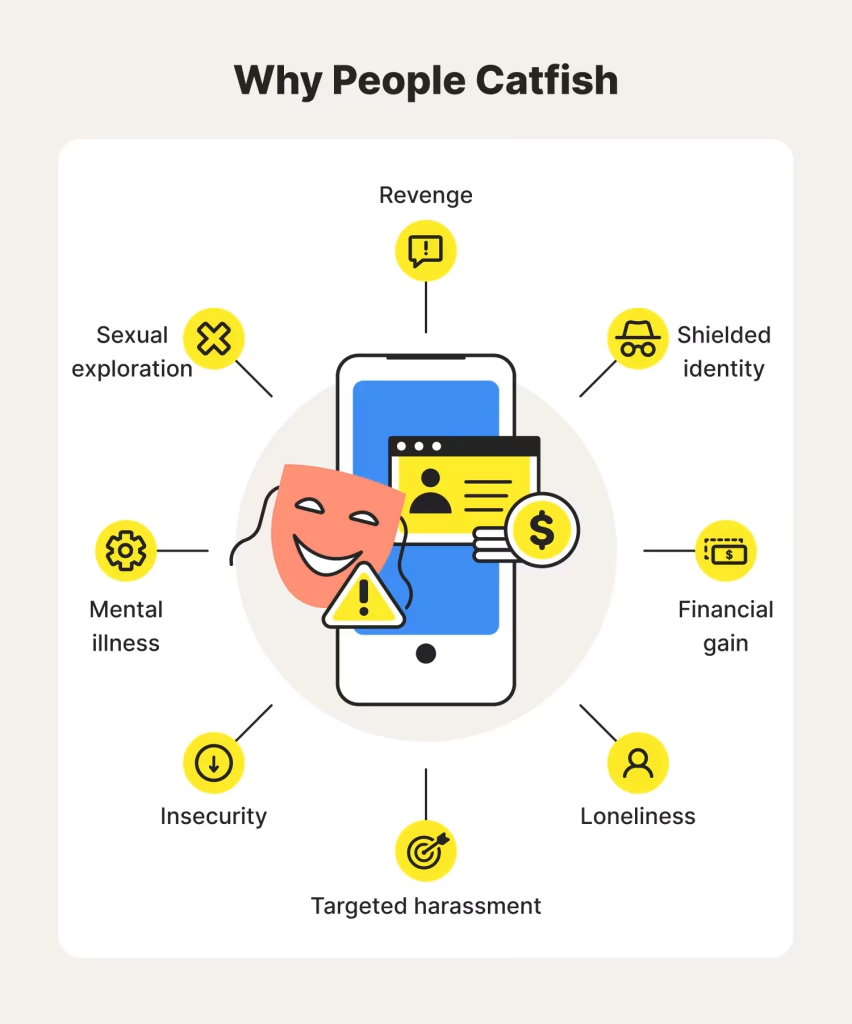When it comes to online dating and social networks, catfishing has become an increasingly common and insidious phenomenon. But why do people go to the trouble of inventing entire personas, using fake photos, and weaving stories to deceive someone online? In this post for DatingAdvisory.org, we’ll explore the psychological, emotional, and pragmatic motivations behind catfishing. We’ll also shed light on how understanding these motives can help protect you and others from falling victim.
What Is Catfishing?
At its core, catfishing is the act of creating a deceptive or false online identity, often to lure someone into an emotional or romantic relationship under false pretenses. While many catfishers are driven by malicious intent such as scams or manipulation others may start with more complex psychological needs. Over time, that deception can spiral into deeper manipulation, emotional damage, or financial fraud.
The consequences can be severe: victims often experience emotional betrayal, loss of trust, shame, and in extreme cases financial loss.
With that in mind, let’s dive into the driving forces behind catfishing behaviors.
Top Motivations Behind Catfishing
1. Loneliness, Social Anxiety & Desire for Connection
A primary motive is the deep human need for connection. Some people feel lonely or isolated, and they find it easier to approach others behind a mask. When someone lacks confidence in their real self, a fictional persona becomes a vehicle to reach out without fear of immediate rejection.
2. Low Self-Esteem & Insecurity
Many catfishers are dissatisfied with who they are physically, socially, or emotionally and believe that their true self will not be accepted. Creating an “ideal” version of themselves is a way to circumvent those insecurities.
3. Personality Traits & Dark Motives
Research into personality correlations shows that traits such as narcissism, psychopathy, and sadism are associated with a higher risk of engaging in catfishing. These individuals may lack empathy, see others as means to an end, or enjoy exerting control and deception.
In one study, psychopathy, sadism, and narcissism emerged as strong predictors of catfishing behavior.
4. Entertainment, Experimentation & Escapism
Not all catfishing is malicious from the start. Some individuals treat it as a game, a way to experiment with identity, or a form of escape from their real-life problems. For them, the thrill is in maintaining the facade rather than in hurting someone.
5. Revenge, Harassment, or Sabotage
In some instances, catfishing serves as a tool for retaliation, revenge, or cyberbullying. Someone scorned, humiliated, or jealous might use a fake identity to defame, humiliate, or emotionally hurt another person.
6. Financial Gain & Scam Motives
The most clearly harmful motive is financial: many catfishers use fabricated stories, crisis narratives, and emotional pressure to solicit money from victims. In some cases, they may later blackmail with intimate images or personal data.
A thematic study found that motivations can be broadly grouped into “emulating an ideal self,” “desiring meaningful interaction,” “entertainment,” and “financial gain.”

Why Understanding Motives Matters for You
- Better detection & discernment
If you know why someone might catfish you, you can more easily spot red flags like overly perfect stories, refusal to video call, or sudden emotional urgency. - Emotional resilience
Understanding that deception often comes from insecurity or pathological motives helps you detach personally and treat the behavior more objectively. - Effective prevention
Knowing the motives helps design better safety measures both in your own online behavior and in the protections and policies offered by dating sites. - Empathy (with caution)
Recognizing root emotional struggles doesn’t excuse the actions, but it can inspire more thoughtful responses (e.g. seeking help or reporting abuse).
Warning Signs & Red Flags
Here are several warning signs you might be interacting with a catfish:
- They refuse to video chat or always cancel.
- Their profile is too perfect or too good to be true.
- They move the relationship forward too quickly (love-bombing).
- They ask for money or gifts, especially under emotional pretexts.
- Their stories or details are inconsistent.
How to Protect Yourself on Dating Platforms
- Always insist on a video call early on.
- Google image search their photos to see if they’ve been used elsewhere.
- Don’t share sensitive personal or financial information.
- Be skeptical of grand promises or urgent blamestory narratives.
- Report suspicious profiles to site moderators and block them.





